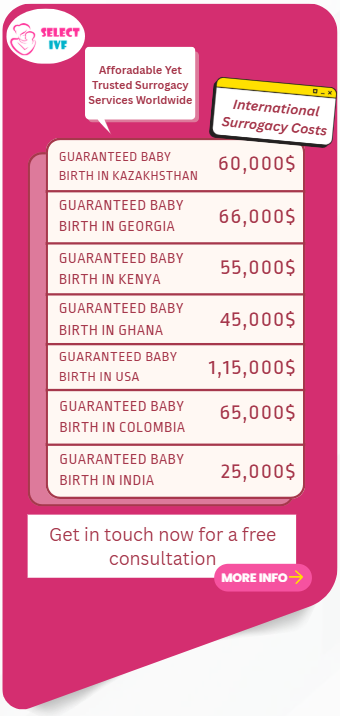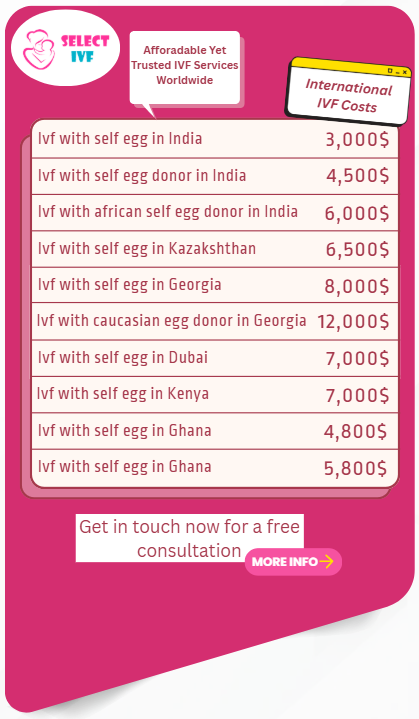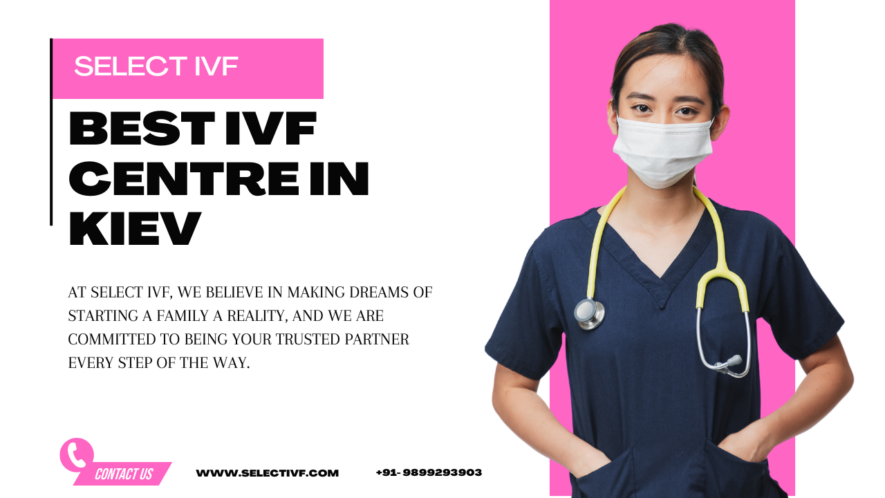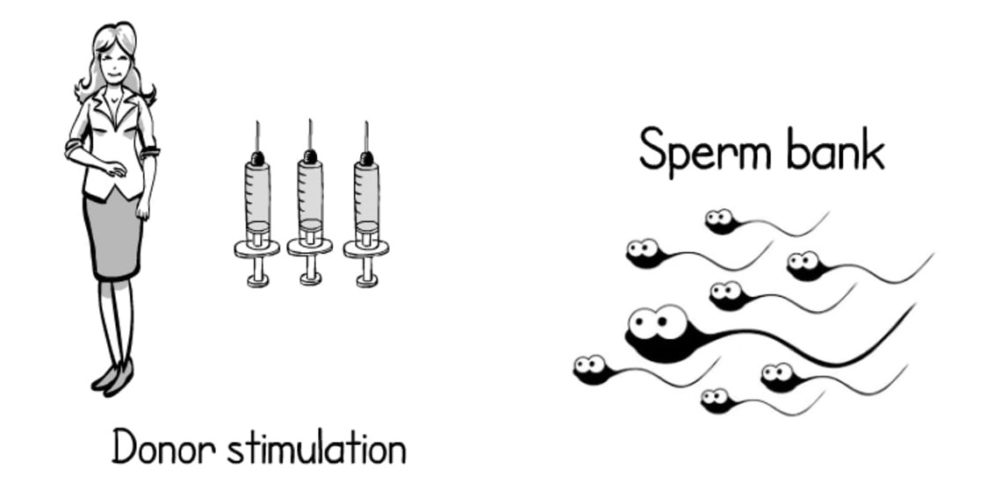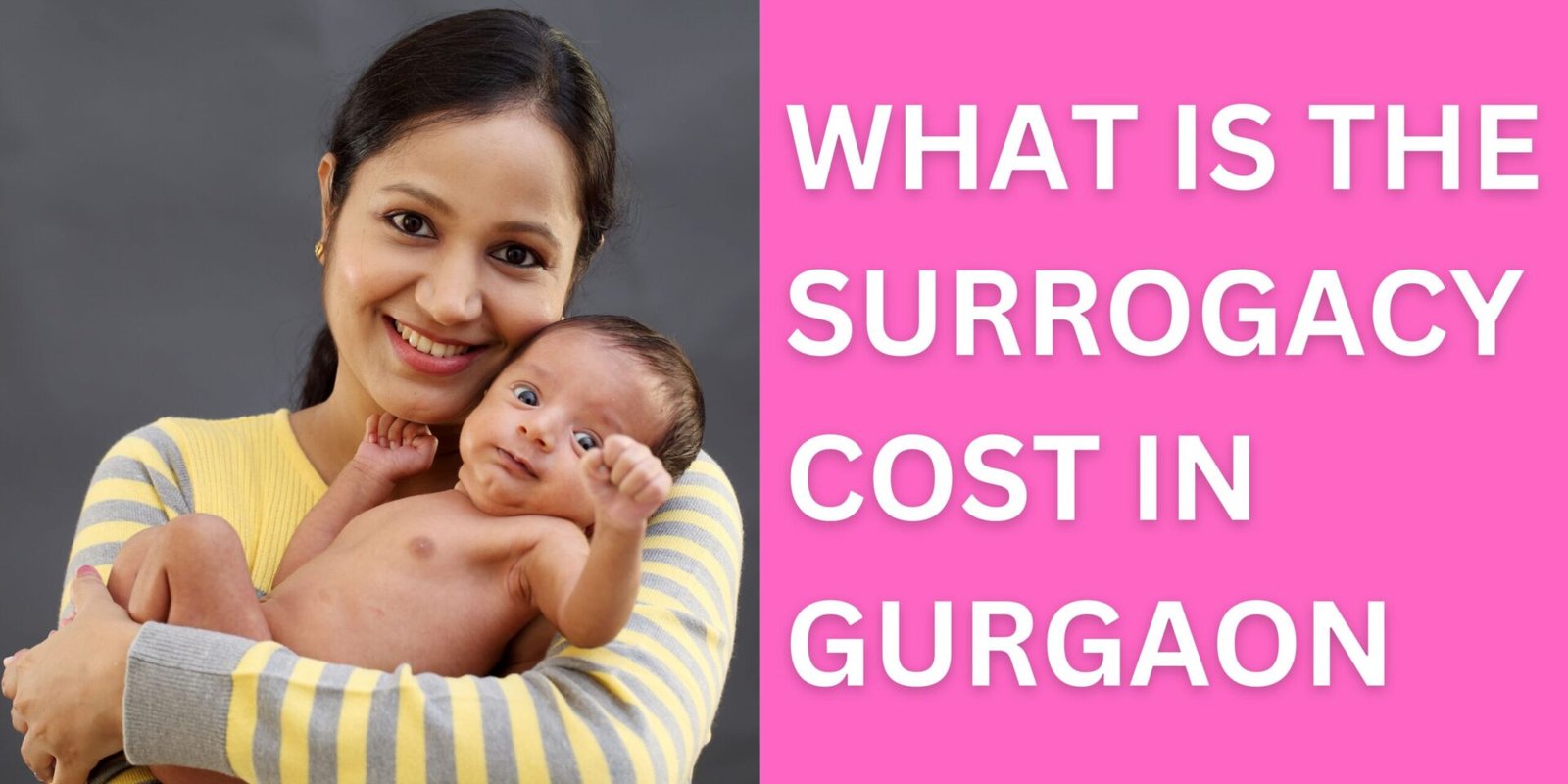Welcome to Select IVF, where we understand the profound impact that infertility can have on your life. For those seeking assisted reproductive solutions, our state-of-the-art facility in Hyderabad offers a comprehensive approach, including IVF with Egg Donor services.
Navigating the journey towards parenthood can be challenging, and understanding the associated costs is crucial. The Cost of IVF With Egg Donor in Hyderabad at Select IVF is thoughtfully structured to provide transparency and affordability. Our experienced team of fertility specialists, cutting-edge technology, and personalized care contribute to the success of our IVF programs.
We recognize the emotional and financial investment involved, and our commitment is to make this transformative experience as seamless as possible. Explore the possibilities with Select IVF, where the dream of building your family is supported by expertise, compassion, and accessible Cost of IVF With Egg Donor in Hyderabad.
Understanding IVF with Egg Donor
Unlock the path to parenthood with Understanding IVF with Egg Donor. This comprehensive guide navigates the intricacies of assisted reproduction, offering insights into the process, success factors, and emotional considerations.
Explanation of IVF Process
In the intricate process of IVF, several essential steps pave the way for successful conception. Initially, the woman undergoes ovarian stimulation, where fertility medications stimulate the ovaries to produce multiple eggs. This crucial step aims to increase the chances of successful fertilization. Subsequently, the eggs are retrieved through a minimally invasive surgical procedure, ensuring minimal discomfort. Following retrieval, the eggs are then carefully examined and prepared for the fertilization phase.
Stimulation of Egg Production: During this initial stage of IVF, fertility medications are administered to stimulate the ovaries to produce a higher number of eggs than the natural menstrual cycle would yield. This is a pivotal step, as a greater number of eggs enhances the likelihood of successful fertilization.
Egg Retrieval: Once the eggs are deemed ready for retrieval, a minor surgical procedure is performed. Guided by ultrasound imaging, a thin needle is inserted through the vaginal wall to access the ovaries and retrieve the mature eggs. The process is typically quick, and any discomfort is minimal, thanks to sedation administered during the procedure.
Fertilization: In the laboratory, the retrieved eggs are combined with sperm, either from the partner or a donor, to facilitate fertilization. This step closely mirrors the natural conception process, albeit occurring outside the body. The fertilized eggs, now embryos, are closely monitored for optimal development.
Embryo Transfer: Once the embryos reach a suitable stage of development, typically three to five days after fertilization, one or more are carefully selected for transfer into the woman’s uterus. This step involves a simple and virtually painless procedure, akin to a standard pelvic exam. The hope is that the transferred embryos will successfully implant, initiating a pregnancy.
Role of Egg Donor in IVF
In IVF, an egg donor plays a crucial role by providing healthy eggs to aspiring parents who may face fertility challenges. This involves a carefully managed process where the donor’s eggs are fertilized with the partner’s or donor sperm, creating embryos that are then transferred to the recipient’s uterus. The egg donor’s contribution is instrumental in helping couples achieve successful pregnancies when conventional methods may not be feasible, offering a pathway to parenthood for those in need.
The Egg Donor Screening Process
The egg donor screening process involves thorough medical, genetic, and psychological evaluations to ensure donors are healthy, genetically sound, and emotionally prepared for egg donation, ensuring a safe and successful reproductive journey.
Application and Initial Assessment
The egg donor screening process typically begins with potential donors submitting detailed applications. These forms encompass personal and medical histories, including information about lifestyle, family health, and any past contributions. Examining these applications to see if the donor satisfies the prerequisites is the first step in the assessment process.
Medical Examination
Accepted donors undergo a comprehensive medical examination. This involves a physical assessment, blood tests, and screenings for infectious diseases. The goal is to ensure the donor is in optimal health and does not carry any conditions that could be transmitted to the recipient or impact the success of the IVF process.
Genetic Testing
Genetic testing is a crucial aspect of the screening process. Donors often undergo tests to identify carriers of genetic disorders. This procedure guarantees a complete grasp of the donor’s genetic history while reducing the possibility of passing on inherited diseases to the progeny.
Psychological Evaluation
Donors undergo psychological assessments to gauge their mental and emotional well-being. This step helps identify any potential psychological concerns or stressors associated with the donation process. It ensures that donors are mentally prepared for the emotional aspects of egg donation and can cope with potential challenges.
Counseling Sessions
Egg donors participate in counseling sessions to discuss the emotional and ethical implications of donation. These sessions provide a platform for donors to express their feelings, ask questions, and gain a comprehensive understanding of the process. Counseling also helps donors make informed decisions and prepares them for the emotional aspects of the donation journey.
Legal Consultation and Consent
Donors engage in legal consultations to understand the legal aspects of egg donation. This involves discussions about rights, responsibilities, and the legal status of the donated eggs. Once fully informed, donors provide formal consent, outlining their agreement with the terms and conditions of the donation process.
Follow-up Monitoring
Even after a successful donation, donors may undergo follow-up monitoring to ensure their well-being. This may involve post-donation medical check-ups and psychological support. The comprehensive screening process, including follow-up care, ensures the health and satisfaction of the egg donor throughout the entire process.
Factors Influencing IVF Costs
IVF costs are influenced by factors like clinic reputation, geographical location, treatment complexity, medication, and additional services. Understanding these variables helps individuals make informed decisions for their fertility journey.
Clinic Reputation and Expertise
The reputation and expertise of the IVF clinic play a pivotal role in determining the overall cost of the procedure. Clinics with a stellar reputation for patient outcomes and skilled staff typically have higher prices. The total cost is heavily influenced by the medical team’s experience, which includes embryologists and fertility specialists. Patients may find that the assurance of high-quality care and successful outcomes comes with a higher price tag.
Location in Hyderabad
The geographical location of the IVF clinic within Hyderabad is another factor influencing costs. Clinics situated in prime locations or areas with higher living costs may pass on these expenses to patients. Additionally, the availability of specialized fertility centers in the vicinity might affect the pricing, as access to state-of-the-art facilities and experienced professionals can impact the overall cost of IVF treatments.
Inclusions in the Package
- Consultations: The extent of consultations included in the IVF package affects the overall cost. Some clinics may offer a comprehensive consultation package that covers pre-treatment assessments, counseling sessions, and post-treatment follow-ups. The frequency and depth of these consultations can influence the total cost.
- Medications: The cost of medications necessary for the IVF process is a significant factor. Fertility medications, including those used for ovarian stimulation and hormonal regulation, can vary in price. Some clinics may provide medication within the overall package cost, while others may bill these separately, impacting the total expenses incurred by the patient.
- Laboratory Tests: Various laboratory tests are essential throughout the IVF journey, from initial assessments to ongoing monitoring. The inclusion of these tests in the package can affect the overall cost. Tests may encompass hormonal assays, genetic screening, and other diagnostic evaluations crucial for the success of the IVF procedure.
- Post-treatment Care: The level and duration of post-treatment care included in the IVF package contribute to the overall cost. This may involve follow-up appointments, monitoring of early pregnancy stages, and additional support services. Clinics offering comprehensive post-treatment care may charge higher fees, providing patients with a sense of security and ongoing assistance during the critical post-implantation period.
Cost Breakdown of IVF with Egg Donor in Hyderabad
Explore transparent pricing at Select IVF Hyderabad. Our cost breakdown for IVF with Egg Donor ensures clarity, offering a comprehensive view of expenses associated with your fertility journey.
Consultation and Evaluation Fees
Initial consultations and evaluations are integral components of the IVF process. Clinics typically charge fees for pre-treatment assessments, medical examinations, and consultations with fertility specialists. These fees cover the initial stages of the IVF journey, ensuring that both the patient and the clinic are well-prepared for the subsequent steps.
Egg Donor Compensation
Egg donors play a crucial role in the IVF process, and their compensation is a significant cost factor. The compensation amount varies and is influenced by factors such as the donor’s experience, the region’s standards, and the specific clinic’s policies. This compensation is intended to recognize the time, effort, and commitment of the egg donor.
Medication Costs
Medication costs encompass the fertility medications administered to both the egg donor and the recipient. These medications stimulate egg production, regulate hormonal levels, and prepare the uterus for embryo implantation. The type and quantity of medications prescribed, as well as the duration of treatment, contribute to the overall medication costs.
Laboratory and Testing Fees
The IVF process involves a series of laboratory tests critical for assessing the health and viability of eggs, sperm, and embryos. These tests include genetic screenings, hormonal assays, and other diagnostic evaluations. The fees associated with these laboratory services are part of the overall IVF cost, ensuring the thorough monitoring and evaluation of key components throughout the treatment.
Embryo Transfer Fees
The embryo transfer procedure, a pivotal step in IVF, incurs specific fees. This includes the preparation of embryos for transfer and the actual transfer process into the recipient’s uterus. The expertise and resources required for a successful embryo transfer contribute to the associated fees, reflecting the precision and care involved in this stage.
Additional Costs
- Cryopreservation: Preservation of additional embryos or eggs for future use incurs cryopreservation costs. This service allows for the storage of unused embryos, providing options for subsequent IVF cycles or family expansion.
- Genetic Testing: Some clinics may offer optional genetic testing for embryos, assessing their chromosomal health. While not always mandatory, this additional service incurs extra costs and provides valuable insights into the genetic health of the embryos.
- Other Ancillary Expenses: Various additional costs may arise, such as fees for anesthesia during procedures, administrative charges, and any unforeseen medical interventions. Understanding and considering these potential extra expenses is crucial for comprehensive financial planning.
Criteria for selecting an egg donor
The selection of an egg donor involves careful consideration of various criteria to ensure compatibility and increase the chances of a successful IVF procedure. Some key criteria include:
Physical Health and Medical History
Potential donors undergo thorough medical evaluations to assess their overall health. They should be in good physical condition, free from chronic illnesses, and have no history of inheritable diseases. A comprehensive medical history review helps ensure the donor’s suitability for the process.
Age and Fertility Potential
Donor age is a critical factor. Younger donors, typically between 21 and 32 years old, tend to have higher-quality eggs with better fertility potential. This age range often ensures healthier and more viable eggs for successful fertilization and implantation.
Genetic Screening and Family Health History
Donors undergo genetic screenings to identify any hereditary conditions or genetic disorders that could be passed on to the offspring. A detailed family health history assessment helps evaluate the risk of passing on genetic abnormalities.
Educational Background and Personal Characteristics
While not always essential, some recipients may prioritize specific educational backgrounds or personal characteristics in their selection process. Donors might be chosen based on qualities such as intelligence, talents, or specific physical attributes to match the recipient’s preferences.
Emotional and Psychological Screening
Evaluating the donor’s mental and emotional well-being is crucial. Psychological assessments and counseling sessions ensure that the donor is emotionally prepared for the donation process. This step helps mitigate any potential stress or emotional challenges associated with egg donation.
Previous Donation Experience
Donors with prior successful donation experiences may be preferred due to their familiarity with the process. Recipients might consider donors with a proven track record of successful donations, indicating reliability and commitment to the process.
Matching Preferences
Some recipients have specific preferences regarding ethnicity, religion, or other cultural aspects they wish to match with the donor. Matching these preferences ensures a level of compatibility between the donor and the recipient, addressing cultural or personal preferences.
Legal and Ethical Considerations
Donors must adhere to legal regulations and ethical standards governing egg donation. Understanding and complying with these regulations are fundamental criteria for selection.
Choosing the Right Clinic
Selecting the right clinic is crucial for a successful fertility journey. Consider expertise, success rates, patient care, and personalized treatment options. Make an informed decision for a supportive and effective experience on your path to parenthood.
Researching Clinic Success Rates: Researching and analyzing clinic success rates is a fundamental step in selecting the right clinic for IVF with an egg donor. Success rates reveal information on how well the clinic performs in producing favorable results. Prospective parents should seek out clinics that have a track record of success, especially when it comes to circumstances like their own. Clinics with higher success rates often indicate experienced medical teams and advanced facilities.
Reading Patient Reviews: Patient reviews offer firsthand accounts of individuals who have undergone fertility treatments at a particular clinic. Reading these reviews provides enlightening perspectives about the patient experience, the effectiveness of communication with clinic staff, and the overall satisfaction of previous patients. A wide range of reviews can provide a thorough picture of the clinic’s advantages and shortcomings.
Clinic Certifications and Accreditations: Certifications and accreditations are crucial indicators of a clinic’s adherence to industry standards and best practices. It is recommended that prospective parents check if a clinic has been accredited by relevant regulatory bodies and certified by reputable organizations. If you follow safety protocols, uphold moral standards, and deliver exceptional patient care, you could receive a certification. Accredited clinics often demonstrate a commitment to maintaining the highest standards in fertility treatment.
Conclusion
Navigating the cost of IVF with an egg donor in Hyderabad requires a nuanced understanding of the factors influencing expenses. From consultation fees to medication costs and additional services, prospective parents must meticulously plan and consider various elements for a comprehensive financial outlook. Choosing the right clinic based on success rates, patient reviews, and certifications is pivotal for a successful and satisfying fertility journey. While the financial investment in IVF is substantial, the potential for building a family often outweighs the costs. Through informed decision-making and careful consideration of each aspect, individuals and couples can embark on their IVF journey in Hyderabad with confidence and optimism.
Frequently Asked Questions (FAQs)
Q1. What is the success rate of IVF with Egg Donor in Hyderabad?
Ans: The success rate of IVF with an egg donor in Hyderabad varies among clinics but generally aligns with global averages, often exceeding 50%. Prospective parents should inquire directly with clinics about their specific success rates.
Q2. How are egg donors screened?
Ans: Egg donors undergo rigorous screening, including medical evaluations, genetic testing, psychological assessments, and legal consultations to ensure their suitability and the health of the offspring.
Q3. Can I choose the characteristics of the egg donor?
Ans: Yes, many clinics allow recipients to choose certain characteristics of the egg donor, including physical attributes, education, and other personal preferences.
Q4. Are there any age restrictions for IVF with egg donor?
Ans: Age restrictions for IVF with an egg donor vary but typically involve age limitations for both donors and recipients. Clinics may have specific age criteria for eligibility.
Q5. What is the average cost range for IVF with Egg Donor in Hyderabad?
Ans: The average cost range for IVF with an egg donor in Hyderabad can vary widely, typically ranging from INR 3,00,000 to INR 5,00,000, inclusive of consultations, medications, and procedures.
Q6. How long does the entire IVF process take?
Ans: The entire IVF process, from initial consultations to embryo transfer, usually takes around four to six weeks, with variations depending on individual circumstances.
Q7. Can I use a known egg donor?
Ans: Yes, some clinics allow the use of a known egg donor, provided they meet the necessary screening and legal requirements.
Q8. How can I improve my chances of success with IVF?
Ans: Improving chances of success involves maintaining a healthy lifestyle, adhering to medical recommendations, and managing stress. Consultation with fertility specialists can provide personalized guidance.
Q9. Are there any alternative treatments to IVF with Egg Donor?
Ans: Alternative treatments to IVF with an egg donor include options like adoption, surrogacy, or exploring other fertility treatments based on individual circumstances.
Q10. What happens during the egg retrieval process?
Ans: The egg retrieval process is a minor surgical procedure where mature eggs are collected from the ovaries using a thin needle, typically conducted under sedation.
Q11. Can I have a multiple pregnancy with IVF?
Ans; While the chance of a multiple pregnancy exists with IVF, especially when transferring more than one embryo, clinics often carefully manage this risk to ensure a healthy outcome.

